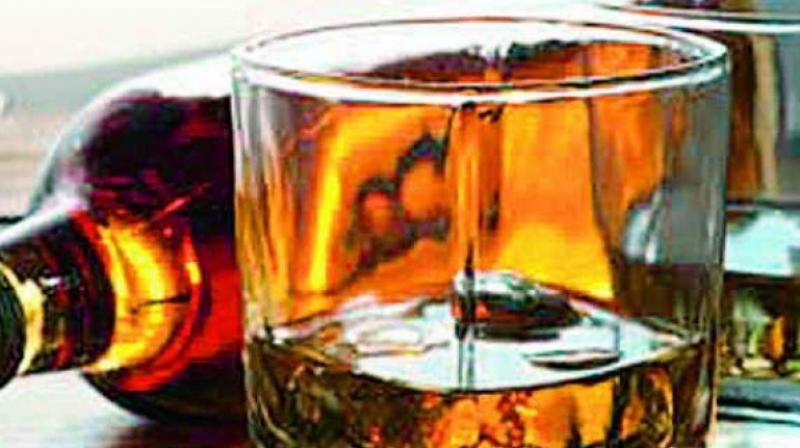Tasmac: Golden goose as an abettor of crime?
Like charity, many crimes also begin at home, with alcoholism being the proximate cause.

The erudite and proactive Justice Anand Venkatesh of the Madras high court has set the cat among the golden geese with his query as to why the Tamil Nadu Government which has a monopoly over liquor vending through its marketing behemoth Tasmac, should not be seen as an abettor in crimes caused by drunkenness. In the case that was being heard, the victim had committed suicide after a drunken brawl.
Like charity, many crimes also begin at home, with alcoholism being the proximate cause. Domestic violence is on the rise. It is a cause and effect.
When a private school can be prosecuted for the death of students on their campuses, citing alleged violation of building norms, why should a government be treated differently? By the same logic, why should a civic body and its contractors escape liability for a road death caused by potholes or open trenches or badly erected speed breakers or protruding manhole cover, exacerbated by poor or nil street lighting, that are death traps?
Section 107 of the Indian Penal Code (IPC) lays down three ingredients to constitute abetment. Instigation, conspiracy and intentional aid or illegal omission. The Supreme Court in Randhir Singh Vs State of Punjab had held that “abetment involves a mental process of instigating a person or intentionally aiding that person in doing of a thing.”
View the penal law of abetment in the context of two Constitutional provisions. Article 47 of states that “the state shall endeavour to bring about prohibition of the consumption of intoxicating drinks and of drugs which are injurious to health.” The government may argue that these are only directive principles of state policy and are not enforceable. True. But Article 37 makes it clear that these principles are nevertheless fundamental in the governance of the country and it shall be the duty of the State to apply these principles in making laws.” Now doesn't the third ingredient of abetment, namely, illegal omission, apply in some measure?
The only difficulty in fastening criminal liability on the state is the absence of direct mens rea or intention. Explanations to Section 108 of the IPC on an abettor are worth considering. Explanation 1 states that “abetment of the illegal omission of an act may amount to an offence although the abettor may not himself be bound to do that act.” Explanation 2 clarifies that “to constitute the offence of abetment, it is not necessary that the act abetted should be committed, or that the effect requisite to constitute the offence should be caused.” Explanation 4 is that “the abetment of an offence being an offence, the abetment of such an abetment is also an offence.”
The moot point is whether creating a conducive atmosphere by making liquor freely available and in any quantity even for those who evidently cannot hold their drink, causing them to lose control of their senses and in a crime prone state of mind would constitute that “requisite effect.” Is selling a bottle of alcohol to an already drunk and violent man the same as putting a knife in the hands of an insane person? Would the principle of res ipsa loquitur, meaning 'the thing speaks for itself' apply here?
The pro-liquor lobby may cite the fundamental right to carry out any trade or occupation under Article 19(1) (g) of the Constitution. This has been negatived by the Supreme Court in Khoday Distilleries Ltd Vs State of Karnataka in the case of businesses that are “inherently pernicious or injurious to health, safety and welfare of the general public.” But in the same breath the Court added that “ the State can create a monopoly either in itself or in the agency created by it, for the manufacture, possession, sale and distribution of liquor.” A legal fox trot?!
Isn't the doctrine of 'Res Extra Commercium' or 'things beyond commerce' pertinent? In a catena of decisions, the Supreme Court has prioritised public health and well being, postulated in the first part of Article 47, over commercial interests. In P.N. Krishna Lal Vs Govt. of Kerala, the Court referred to liquor trade as “inherently pernicious or dangerous” which “endangers the community.”
Not long ago, in the context of “alarming statistics on the occurrence of road accidents” on national highways, the Supreme Court in State of Tamil Nadu Vs K. Balu ruled that “the existence of liquor vends; advertisements and sign boards drawing attention to the availability of liquor coupled with the arduous drives particularly in heavy vehicles makes it abundantly necessary to enforce the policy of the Union government to safeguard human life. In doing so, the court does not fashion its own policy but enforces the right to life under Article 21 of the Constitution.”
It referred to Para 92(2) of the Union government's 'Model Policy' on a ban on liquor retailing 100 metres from religious, educational institutions or hospitals and 220 metres from state and national highways. If governments can be made alive to the inherently dangerous practice of selling liquor along highways to minimise accidents, what about its role in crime prevention? What about domestic violence and its cascading effect on the entire family? What about its duty to ensure “adequate means of livelihood” to its citizens and the “opportunities and facilities” for children to “develop in a healthy manner” and the “protection of childhood and youth” from “moral and material abandonment”, contained in Articles 39 (a) and (f)?
Law is not static. For it to truly evolve and be in sync with the times, legal thinking must be without blinkers and out of the box. That would give society a real high!
(The writer is an advocate at the Madras high court, columnist & author)

